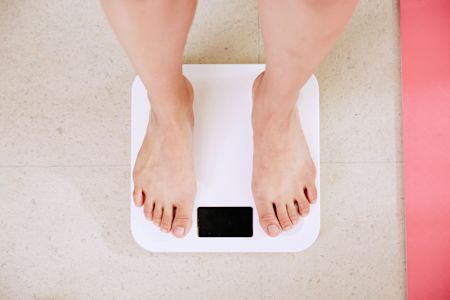They joined The Body Coach app last January – here's what changed in a year
Last January, these 3 women downloaded The Body Coach app, each with a different goal.
Sign up to The Body Coach newsletter to get inspiration in your inbox every Monday.

As you get older, you may start to notice changes in your body – some subtle, like feeling a bit more tired than usual, and others more noticeable, such as changes in weight, energy levels, or how your clothes fit.
One of the most common and often frustrating changes may be weight gain. But here’s the truth: it’s very common as we age. It’s all about how our lifestyles evolve and how our bodies naturally do over time, too. (But it’s not a foregone conclusion!)
We want to unpack some of the reasons why this might happen – such as changes in hormones and muscle mass – as well as share some simple tips to help you feel strong.
Professor Naveed Sattar, is a professor of Cardiometabolic Medicine, specialising in cardiovascular and metabolic health. He shares some reasons why we might gain weight as we get older – plus some helpful tips on navigating this time.
While many reasons for weight gain are to do with our biology and bodies changing over time, there are often life events that lead to this. In our teenage years, for example, we have freedom from routine, says Professor Sattar. We have more of an opportunity to be physically active. However, as we get older and either have work, children, families, and more responsibilities, our opportunities to be active can often decrease.
Muscle mass decreases around 3 - 8% per decade after the age of 30 – and this rate of decline is even higher after the age of 60. Age-related muscle loss, called sarcopenia, is a natural part of aging. Less muscle means greater weakness and less mobility. Ultimately, losing muscle can affect our strength and how fast we burn calories.
Because of this, and the presence of potential new aches and pains, our capacity to go and do really “hard activity” can lessen, says Prof. Sattar. At this time, he says, it’s commonly seen that people may drop off playing football or hockey, for example.
Your metabolic rate is the speed your body burns energy. Studies shows this slows down with age – particularly from the age of 60. As metabolism slows with age, if calorie intake is not adjusted to match the body's reduced calorie needs, weight gain is more likely.
Our biology make-up changes as we get older, too. We’re less able to store fat peripherally and start to store it centrally, says Prof. Sattar. This can start to permeate organs, which can affect our metabolism and capacity to be physically active.
Weight gain is one of the most common side effects of perimenopause and menopause, affecting at least 50% of women. The SWAN study and The Healthy Women’s study suggests that, on average, women gain approximately 1.5kg per year during the perimenopause transition.
“During perimenopause and menopause, our bodies look to combat falling levels of the hormone oestrogen by trying to obtain it elsewhere – chiefly a different form of the hormone produced by fat cells called oestrone,” explains Dr Louise Newson. Read more here.
Age can affect our ability to sleep well – with people sleeping less as they get older. Older adults are found to spend more time in the earlier, lighter stages of sleep and less time in the later, deeper stages.
“We underestimate the link between sleep and appetite and weight,” says Prof. Sattar. “Evidence suggests poor sleep can affect appetite.”
“All these factors affect all of us,” says Prof. Sattar, who believes that small changes in your diet and your habits can really help. “It’s what you do over time that can really make a difference. The key thing for the ageing population is eating less dense calories, less salt and sugar, and improving the quality of your diet.
“But also, improve your activity levels and maintain them to a certain level,” he says. “Find ways in life to fit in activity with less conscious effort – cycling to work, improving your step count each day. It’s not easy for everyone, but small changes can help.
“If you go crazy, it won’t be sustainable. Try all the things. What’s doable, what’s realistic?
“People need to believe that you can make changes, and not be scared to try and fail. Some of these things take time. We can gradually improve little bits of our life over time – just think, you could say to yourself: ‘If I keep physically active, my joints will be better when I’m 70.’”
All these small choices add up. You have the power to take control.
This article was written by The Body Coach content team.